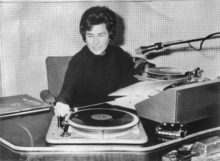Dione Venables
The topic of this article may not meet Wikipedia's notability guideline for biographies. (June 2020) |
Dione Venables | |
|---|---|
 Dione Venables, BFBS Malta, circa 1972 (courtesy Nicola Loftus) | |
| Born | Dione Gordon-Finlay 1930 |
| Pen name | DG Finlay |
| Occupation | Novelist, Publisher |
| Nationality | English |
| Spouse |
1 - Geoffrey FD Loftus
(m. 1949; div. 1964)2 - John R Venables
(m. 1964; death 1996) |
| Children | 4 |
| Parents | Alan Gordon Finlay; Florence Gallagher |
Dione Patricia Mary Venables, also known by her pen name as DG Finlay, is an English novelist and publisher,[1] who also founded The Orwell Society.[2][3]
Life and Works
Dione Venables was born Dione Gordon-Finlay in Great Missenden, England in 1930, the second daughter of Alan and Florence (née Gallagher). Her early childhood was dominated by a life at St. Leonard's boarding-school from the age of three, and then twice narrowly escaping with her life during The Blitz in London.[4] She developed a relationship with Arthur Ransome during the 2nd World War, who encouraged her to write. Her first attempt (aged 11) featured a hedgehog called Edward Wigg, who was adapted by her cousin Jacintha Buddicom in support of the War Effort as part of the National Savings Movement.[5][6] Venables wrote her own diaries, but it wasn’t until 1962 that she published her first articles for magazines and local newspapers reporting on her experiences in Africa,[7] the Middle East and Pakistan, while providing relief flights for refugees in war torn states.[8]
In 1969, Venables began writing and presenting scripts for radio[9] and in 1978, she published her first novel,[10] with its sequel a year later.[11] In the 1980s, she published five more novels before switching her attention to publishing.[12][13][14][15][16]

In 2006, Venables created Finlay Publisher with the aim of promoting the life and works of the writer George Orwell. Finlay Publisher’s first act was to print a new edition of Eric & Us,[17] adding an important post-script written by Venables[18] based on a series of previously unpublished diaries, letters and documented interviews.[19][20] In August of the same year, Venables created a website called Orwell Direct, a forum for academics and enthusiasts alike to exchange views about Orwell, which in 2008, began publishing a series of twenty articles written by eminent Literati, who between them had written at length about George Orwell. They included Sir Bernard Crick, Gordon Bowker, DJ Taylor, Professor Peter Davison and Orwell’s son, Richard Blair.[21] Contributors encouraged Venables to institute a more formal collective of Orwell enthusiasts and on December 27, 2010, The Orwell Society was inaugurated by Venables at Phyllis Court. In 2015, she compiled and published Orwell’s poetry,[22][23][24] and in 2017, she published an account of her own war time experiences.[25]
References
- ^ The Orwell Foundation. "Dione Venables: Orwell - Plain speaking and hidden agendas". The Orwell Foundation. The Orwell Foundation. Retrieved 9 June 2020.
- ^ The Orwell Society. "History". The Orwell Society. The Orwell Society. Retrieved 9 June 2020.
- ^ The Orwell Society. "The Orwell Society George Talks Dione Venables and Richard Blair 20 December 2020". YouTube. The Orwell Society. Retrieved 26 December 2020.
- ^ Venables, Dione (2017). Dione's War. Chichester: Finlay Publisher.
- ^ Watkiss Singleton, Rosalind (2014). 'Doing Your Bit': Women and the National Savings Movement in the Second World War. Palgrave Macmillan, London. pp. 217–231. doi:10.1057/9781137348999_14. ISBN 978-1-137-34897-5. Retrieved 25 September 2020.
- ^ Buddicom, Jacintha (1942). "The Happy Hedgehogs". National Savings Committee, London & Edinburgh (Wartime Pamphlets). WFL 14.
- ^ Loftus, Dione (1962). "A Surrey Air Hostess in Africa". The Surrey Advertiser.
- ^ Loftus, Dione (August 1966). "An Icon with Love". She.
- ^ BFBS publicity photograph, circa 1972
- ^ Finlay, DG (1978). Once Around The Sun. London: WH Allen & Co. ISBN 0352301880.
- ^ Finlay, DG (1979). The Edge of Tomorrow. London: WH Allen & Co. ISBN 0352304073.
- ^ Finlay, DG (1984). Watchman. London: Century. ISBN 0712602380.
- ^ Finlay, DG (1986). The Grey Regard. London: Century. ISBN 0712695079.
- ^ Finlay, DG (1987). Deadly Relation. London: Century Hutchinson & Co. ISBN 0712616500.
- ^ Finlay, DG (1987). Graven Image. London: Century Hutchinson & Co. ISBN 0712616500.
- ^ Finlay, DG (1989). The Killing Glance. London: Arrow Books Ltd. ISBN 0099558602.
- ^ Buddicom, Jacintha (2006). Eric & Us. Chichester: Finlay Publisher. ISBN 978-0-9553708-0-9.
- ^ Taylor, DJ (2003). Orwell: The Life. London: Henry Holt and Company. ISBN 9780805074734. Retrieved 25 March 2021.
- ^ Yeates, Robert (2013). "Modern Fiction Studies". JSTOR. 59 (No. 4): 883–886. Retrieved 25 March 2021.
{{cite journal}}:|issue=has extra text (help) - ^ Hughes, Kathryn. "George Orwells: Such were the Joys". The Guardian (UK edition): CULTURE. The Guardian. Retrieved 25 March 2021.
- ^ Davison, Professor Peter (22 October 2011). "Farewell & Hail to Orwell site". The Orwell Society Newsletter. 1. Retrieved 26 September 2020.
- ^ The Newsroom. "FESTIVAL OF CHICHESTER: In praise of George Orwell's poetry". Chichester Observer. Retrieved 25 March 2021.
{{cite web}}:|last1=has generic name (help) - ^ Howard, Kait. "Okay, okay: Orwell was no Byron". Melville House. Melville House. Retrieved 25 March 2021.
- ^ Venables. George Orwell - The Collected Poetry. Finlay Publisher 2015.
- ^ Venables, Dione (2017). Dione's War. Chichester: Finlay Publisher.
